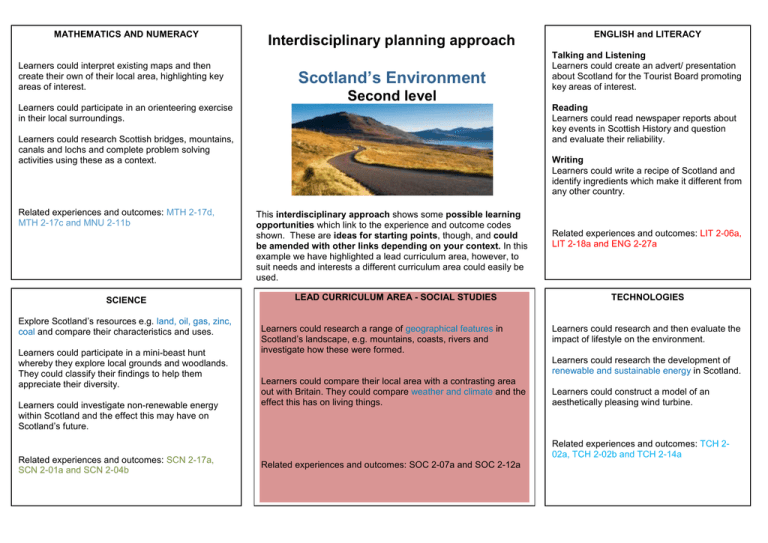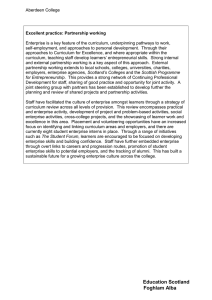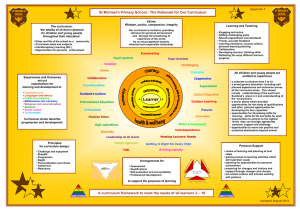Document 13140674
advertisement

MATHEMATICS AND NUMERACY Learners could interpret existing maps and then create their own of their local area, highlighting key areas of interest. Interdisciplinary planning approach Scotland’s Environment Second level Learners could research Scottish bridges, mountains, canals and lochs and complete problem solving activities using these as a context. SCIENCE Explore Scotland’s resources e.g. land, oil, gas, zinc, coal and compare their characteristics and uses. Learners could participate in a mini-beast hunt whereby they explore local grounds and woodlands. They could classify their findings to help them appreciate their diversity. Learners could investigate non-renewable energy within Scotland and the effect this may have on Scotland’s future. Related experiences and outcomes: SCN 2-17a, SCN 2-01a and SCN 2-04b Talking and Listening Learners could create an advert/ presentation about Scotland for the Tourist Board promoting key areas of interest. Reading Learners could read newspaper reports about key events in Scottish History and question and evaluate their reliability. Learners could participate in an orienteering exercise in their local surroundings. Related experiences and outcomes: MTH 2-17d, MTH 2-17c and MNU 2-11b ENGLISH and LITERACY Writing Learners could write a recipe of Scotland and identify ingredients which make it different from any other country. This interdisciplinary approach shows some possible learning opportunities which link to the experience and outcome codes shown. These are ideas for starting points, though, and could be amended with other links depending on your context. In this example we have highlighted a lead curriculum area, however, to suit needs and interests a different curriculum area could easily be used. LEAD CURRICULUM AREA - SOCIAL STUDIES Learners could research a range of geographical features in Scotland’s landscape, e.g. mountains, coasts, rivers and investigate how these were formed. Related experiences and outcomes: LIT 2-06a, LIT 2-18a and ENG 2-27a TECHNOLOGIES Learners could research and then evaluate the impact of lifestyle on the environment. Learners could research the development of renewable and sustainable energy in Scotland. Learners could compare their local area with a contrasting area out with Britain. They could compare weather and climate and the effect this has on living things. Learners could construct a model of an aesthetically pleasing wind turbine. Related experiences and outcomes: TCH 202a, TCH 2-02b and TCH 2-14a Related experiences and outcomes: SOC 2-07a and SOC 2-12a





